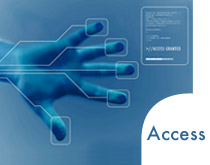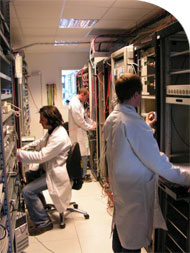Tests ADSL TR-067
The Technical report TR-067 has been written by Broadband Forum experts. It provides a set of test methods to verify the transceiver functional requirements and the physical layer performances of an ADSL modem implemented in accordance with ITU-T G.992.1. Higher layer functionality test cases are also defined in this document.
An ADSL system consists of DSLAMs, filters and splitters located at both ends of the local loop, and CPE modems.
These systems are tested for dynamic interoperability on a set of loops and noise conditions which allows a large covering of loop conditions representative of network operator’s deployments.
| Ref | Tests |
| 8 | Physical Layer Test Cases |
| 8.1 | ADSL Functionnality |
| 8.1.1 | Basic Functional Bit Swap Test |
| 8.1.2 | Verification of CRC error reporting by ATU-R |
| 8.1.3 | Check ADSL Diagnostic Tools |
| 8.1.4 | Dying gasp |
| 8.1.5 | Modular connector pins |
| 8.1.6 | Ethernet Connector pins |
| 8.1.7 | Upstream Power Cutback |
| 8.1.8 | ATU-R Register Reporting via EOC |
| 8.1.9 | Request Downstream Power Cutback |
| 8.2 | Sudden Application Of RFI |
| 8.3 | DSL Noise Spikes/Surges Tests |
| 8.4 | Stress Test |
| 8.5 | Electrical Compatibility Tests |
| 8.5.1 | Analogue Front End Power |
| 8.5.2 | PSD Measurement |
| 8.5.3 | Longitudinal Balance—LCL |
| 8.5.4 | Longitudinal Balance—LOV |
| 9 | Higher Layer Test Cases |
| 9.1 | ATM Connectivity Test |
| 9.1.1 | Loopback at ATU-R |
| 9.1.2 | Maximum number of VC's |
| 9.1.3 | Maximum VPI/VCI Range |
| 9.1.4 | Default VPI/VCI |
| 9.1.5 | QoS Support for CBR/UBR Traffic |
| 9.1.6 | QoS Support for rtVBR/UBR Traffic |
| 9.1.7 | QoS Support for nrtVBR / UBR Traffic |
| 9.1.8 | F5 OAM Support |
| Annex A | Physical Layer Test Cases For Systems Using G.992.1 Annex A |
| A.2.1 | CPE Margin verification tests |
| A.2.2 | Verification of Downstream Fine Gain Values |
| A.2.3 | Loop Tests with Ports Set for Adaptive Rate |
| A.2.4 | Loop Tests with Ports Set for Fixed Rate |















